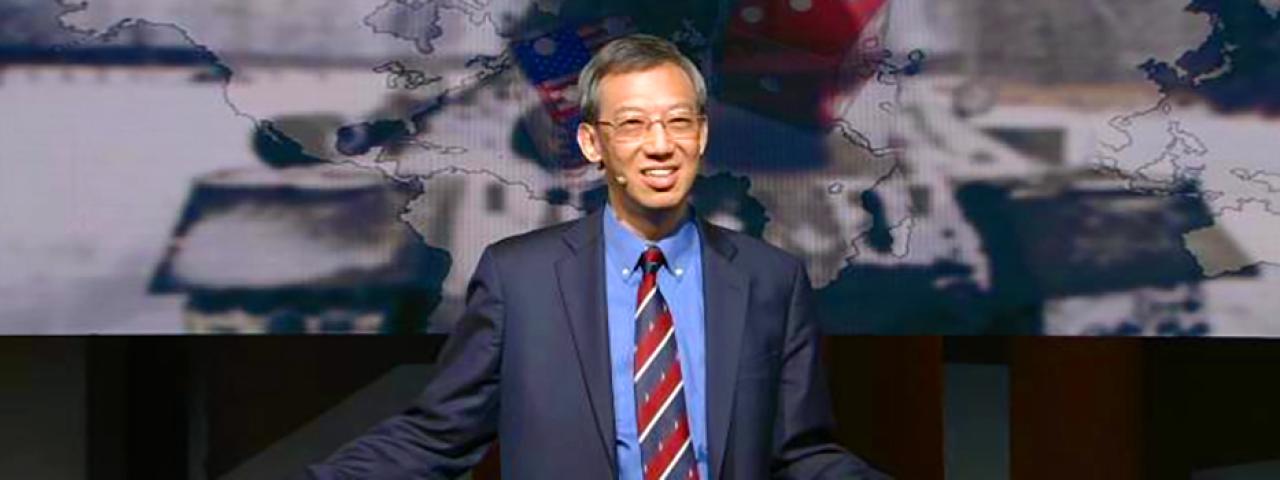
Relations between Beijing and Washington will be characterized by major challenges instead of crises, as long as neither side makes serious mistakes, said Chen Jian, NYU Distinguished Global Network Professor of History at NYU Shanghai during a recent TV lecture.
Appearing on Phoenix TV’s China Forum, Professor Chen, an expert on the history of the Cold War and Sino-US relations, recounted the evolution of relation between the two countries from total confrontation to a “tacit alliance” during 1950-80s.
According to Professor Chen, ties between China and the US today have grown more interdependent, diverse and complicated than ever before. However, we can still gain insights from the Cold War.
“For the US, confrontation with China cannot fix its problems such as the declining middle class, ideologized politics and polarized ideology. As for China, the biggest challenges still lie within itself, such as near-collapse of moral bottom-line as well as power-led corruption,” the Professor said. “Countries like China and the US can be knocked down by nobody but themselves,” he added.

Q: It is very difficult for China to join certain international cooperative frameworks such as TPP or TTIP, led by the US, Japan and the European Union. Do you think China’s initiatives such as “One Belt, One Road” and the Asian Infrastructure Investment Bank (AIIB) will be able to hedge against constraints posed by the US?
A: First, I think what you mentioned is a matter of complementation rather than hedging. In today’s world, there exists no fundamental alternative to the existing international order and structure, especially in international trade or global economy. One may try to fix problems in the existing system, but one simply cannot build another and alternative system.
China is an “insider,” rather than an “outsider” of the existing international systems. It proposed the “One Belt, One Road” initiative and the AIIB based on its view on history and its judgment of the current circumstance. It is a sort of modification to the current international systems. This is a matter for negotiation, rather than one for confrontation.
What’s important is that we should not view such matters as reasons for directing resources to prepare for confrontation. These are not matters that can or should be resolved by large-scale arms race. We have seen enough during the two world wars and in the Cold War. But the world today has changed.
Q: The Democratic People's Republic of Korea is actively engaging in the miniaturization of nuclear weapons, which neither China nor the US would like to see happen. What can the two countries do together in terms of containing Pyongyang?
A: Today, big countries cannot always suppress small countries; instead, small countries sometimes may “hijack” big countries. North Korea is quite good at this.
An abnormal country, such as North Korea, might be viable for a period of time. However, as a historian I believe that it will come to an end in one way or another eventually in a normal world.
What China and the US should do is not to criticize each other but, rather, to learn of each other’s strengths and limits, and prepare for the day to come.

Q: From a historical perspective, what do you think that China may do to learn from the US in terms of managing territorial issues?
A: About the territorial expansion in modern US history, there is a very important demarcation point, which is the two world wars. Before that, territories obtained by force could be “legitimized” by treaties between parties involved. After World War II, along with prevailing of decolonization and national self-determination, this is no longer the case. This, however, sometimes also led to tension with concept and practice of “sovereignty” in today’s international mechanisms.
On this point, the US has its advantages. As a multi-ethnic country, the US is constitutionally quite stable. One, for example, does not hear things like Hawaii asking for independence. The strength of American democracy lies not only in its design for power checking and balancing but also in its system of managing relations between federal, state, and local levels.
If China has to learn anything from the US, this is one. China faces a more complicated situation than the US regarding central-local and inter-ethnic relations. In a sense, this is a constitutional challenge that China will have to address.

